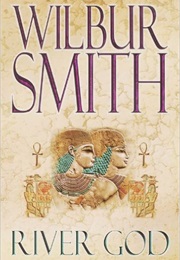



We see the heart as functioning to pump blood and the brain as the seat of consciousness: intelligence, emotion, volition and whatever we mean by spirit. Today, most of us would say the ancient Egyptians were wrong. The Egyptians may have at some point developed a more sophisticated understanding of the brain than scholars once thought, but Smith clearly based his fiction on research. At that time, physicians will use a special spoon - or other tools - to go in through the nose, remove the brain, and toss it out. The heart, however, he leaves for thorough mummification procedures later. When an important character dies in River God, Taita preserves the body for transport by removing and storing the organs in canopic jars. If the heart is heavy with sin, it will tip the scales and the soul will not pass into paradise.Īccordingly, the heart received special treatment during embalming. A feather - the symbol of Maat, goddess of balance and justice - represents the truth. The deceased’s heart is placed opposite the truth on a scale. According to Egyptian mythology, the dead present themselves before Osiris, god of the afterlife. The heart was even crucial in judgment after death. Flinders Petrie details not one but two conceptions of the heart, the ab (“the will and intentions”) and the hati (“the physical heart”). It tells me the Egyptians considered the heart to be the “centre of human intelligence.” Also, The Religion of Ancient Egypt (1906) by Sir W.M. Rick Riordan’s YA series The Kane Chronicles (2010–2012) isn’t much help, but nonfiction like An Introduction to Egyptology (1990) by James Putnam backs up Smith’s portrayal of Taita. My son is into Egyptology, so books on Egypt are always lying around. By contrast, he views the heart as the “fountain from which all thought and emotion springs.”Īncient Egyptian thought did indeed value the heart. In his view, the brain is useless, mere “pale porridge that fills the skull,” “soft amorphous curds,” a “bloodless puddle of curdled milk.” He can’t understand why the gods put such worthless goop in us.

As Taita operates, he reflects on the body’s organs. Early in the book, Taita must trepan the skull of an injured man, an operation scholars believe the ancient Egyptians actually performed. Noncerebral thinking is the idea I find fascinating.


 0 kommentar(er)
0 kommentar(er)
